Template Argument Deduction of Class Templates
In my last post, Template Arguments, I wrote about function template type deduction (C++98) and auto type deduction (C++11). Today I wear more modern hats. I start with automatic type deduction of non-type template parameters and class templates (C++17) and finish with automatic type deduction of concepts (C++20).
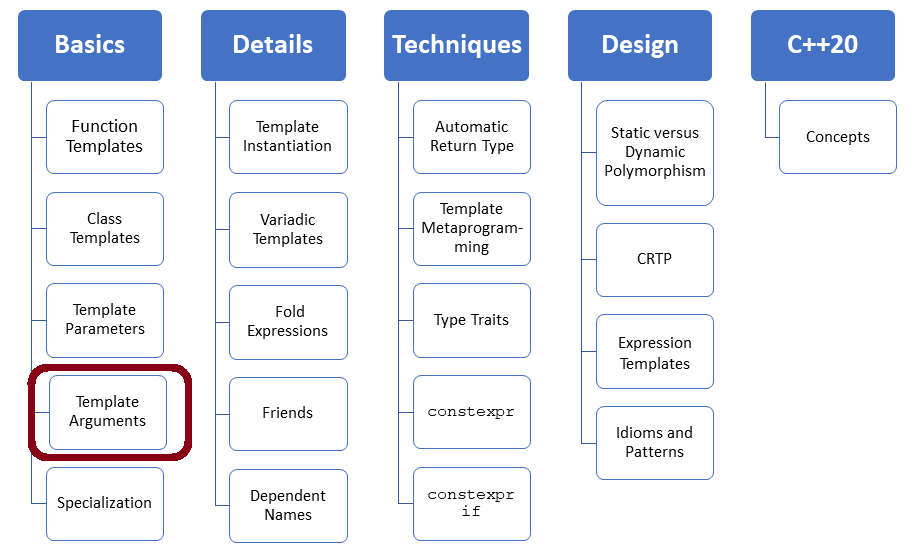
Following the chronological order, let me start with two C++17 features: type deduction of non-type template parameters and type deduction of class templates in C++17.
Automatic type deduction of non-type template parameters
First of all. What are non-type template parameters? These are nullptr, integral values such as bool, and int, lvalue references, pointer, enumerations, and with C++20 floating-point values. Most of the time, integral types are used, and so do I.
After this theory, let’s start with an example.
template <auto N> // (1) class MyClass{ .... }; template <int N> // (2) class MyClass<N> { .... }; MyClass<'x'> myClass1; // (3) MyClass<2017> myClass2; // (4)
By using auto in (1) in the template signature, N is a non-type template parameter. The compiler will automatically deduce it. You can also partially specialize for int (2). The template instantiation (3) will use the primary template (1), and the following template instantiation the partial specialization for int (4).
The usual type modifiers can be used to constrain the type of the non-type template parameters.
template <const auto* p> class S;
In this declaration of a class template S, p must be a pointer to const.
The automatic type deduction for non-type templates can also be applied to variadic templates.
 Modernes C++ Mentoring
Modernes C++ Mentoring
Do you want to stay informed: Subscribe.
template <auto... ns> class VariadicTemplate{ .... }; template <auto n1, decltype(n1)... ns> class TypedVariadicTemplate{ .... };
VariadicTemplate can deduce an arbitrary number of non-type template parameters. TypeVariadicTemplate will only deduce the first template parameter. The remaining templated parameters will be of the same type as the first type: decltype(n1).
Automatic type deduction from class templates makes the usage of class templates quite comfortable.
Automatic Type Deduction of Class Templates
A function template can deduce its type parameters from its function arguments. But that was not possible for particular functions: constructors of class templates. With C++17, this statement is simply wrong. A constructor can deduce its type parameters from its constructor arguments. Here is the first example.
// templateArgumentDeduction.cpp #include <iostream> template <typename T> void showMe(const T& t) { std::cout << t << '\n'; } template <typename T> struct ShowMe{ ShowMe(const T& t) { std::cout << t << '\n'; } }; int main() { std::cout << '\n'; showMe(5.5); // not showMe<double>(5.5); showMe(5); // not showMe<int>(5); ShowMe(5.5); // not ShowMe<double>(5.5); ShowMe(5); // not ShowMe<int>(5); std::cout << '\n'; }
Let me say a few words about the main function. The instantiation of the function template showMe has been valid since the first C++ standard C++98, but the instantiation of the class template ShowMe since C++17. From the user’s perspective, using functions templates or class templates feels just like an ordinary function or class.
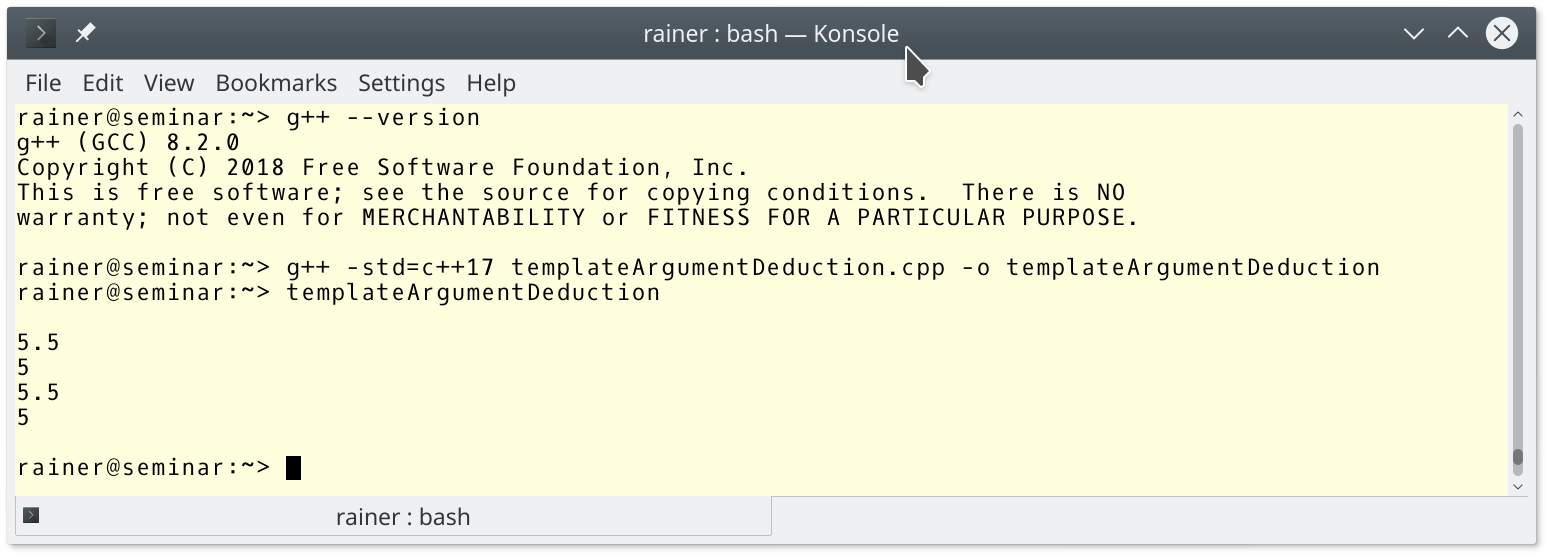
Maybe, you are not convinced. Here are more examples of class template argument deduction.
// classTemplateArgumentDeduction.cpp #include <array> #include <vector> #include <mutex> #include <memory> int main() { std::array myArr{1, 2, 3}; // deduces std::array<int, 3> std::vector myVec{1.5, 2.5}; // deduces std::vector<double> std::mutex mut; std::lock_guard myLock(mut); // deduces std::lock_guard<mutex>(mut); std::pair myPair(5, 5.5); // deduces std::pair<int, double> std::tuple myTup(5, myArr, myVec); // deduces std::tuple<int, // std::array<int, 3>, std::vector<double>> }
The comments show the C++17 compiler deduced types. Thanks to C++ Insights, you can visualize this process of template argument deduction.
The last two examples to std::pair and std::tuple are pretty interesting. Before C++17, we used factory functions such as std::make_pair or std::make_tuple to create a std::pair or a std::tuple without specifying the type parameters. In contrast to class templates, the compiler could deduce the type parameter from the function arguments. Here is a simplified version of std::pair.
// makePair.cpp
#include <utility> template<typename T1, typename T2> std::pair<T1, T2> make_pair2(T1 t1, T2 t2) { return std::pair<T1, T2>(t1, t2); } int main() { auto arg{5.5}; auto pair1 = std::make_pair(5, arg); auto pair2 = make_pair2(5, arg); auto pair3 = std::pair(5, arg); }
The compiler deduces the same type for pair1 and pair2. With C++17, we don’t need this factory function anymore and can directly invoke the constructor of std::pair to get pair3.
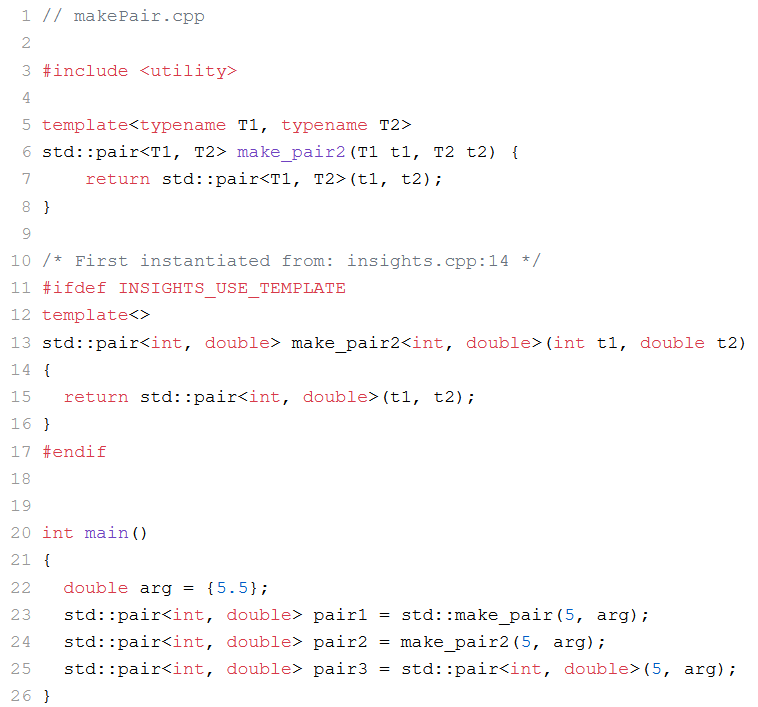
You can study the program on C++ Insights.
You may wonder why my function template make_pair2 took its arguments by value. std::make_pair decays its arguments, and so does my function template make_pair2. I wrote about the decay of function arguments in my last post Template Arguments.
Before I write a few words about the automatic type deduction with concepts, I want to emphasize is explicit. Automatic type deduction is more than convenient. It’s a security feature. You cannot make an error when you don’t specify the type.
// automaticTypeDeduction.cpp #include <string> template<typename T> void func(T) {}; template <typename T> struct Class{ Class(T){} }; int main() { int a1 = 5.5; // static_cast<int>(5.5) auto a2 = 5.5; func<float>(5.5); // static_cast<float>(5.5) func(5.5); Class<std::string> class1("class"); // calls essentially std::string("class") Class class2("class"); }
All errors are only because I explicitly specified the type:
int a1triggers the narrowing conversion fromdoubletointfunc<float>(5.5)causes the conversion from thedoublevalue5.5tofloatClass<std::string> class1("class")creates a C++-string initialized with a C-string.
If you want to study the program, here it is: C++ Insights.
There is not much to add to the story of automatic type deduction when concepts come into play.
Automatic Type Deduction with Concepts
Automatic type deduction with concepts work like expected:
// typeDeductionConcepts.cpp #include <concepts> void foo(auto t) {} // (1) void bar(std::integral auto t){} // (2) template <std::regular T> // (3) struct Class{ Class(T){} }; int main() { foo(5.5); bar(5); Class cl(true); }
Whether you use an unconstrained placeholder (auto in line 1), a constrained placeholder (a concept in line 2), or a restricted template parameter (a concept in line 3), the compiler deduces the expected type. C++ Insights helps to visualize the type deduction.
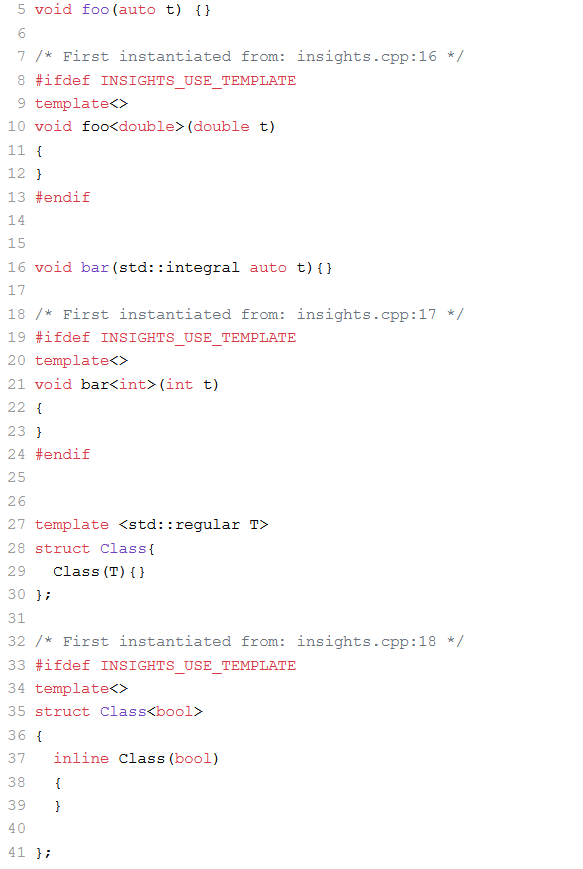
What’s next?
In my next post, I will write about the next exciting feature of templates: specialization. You can fully specialize a function template or class template. Additionally, a class template can be partially specialized.
Thanks a lot to my Patreon Supporters: Matt Braun, Roman Postanciuc, Tobias Zindl, G Prvulovic, Reinhold Dröge, Abernitzke, Frank Grimm, Sakib, Broeserl, António Pina, Sergey Agafyin, Андрей Бурмистров, Jake, GS, Lawton Shoemake, Jozo Leko, John Breland, Venkat Nandam, Jose Francisco, Douglas Tinkham, Kuchlong Kuchlong, Robert Blanch, Truels Wissneth, Mario Luoni, Friedrich Huber, lennonli, Pramod Tikare Muralidhara, Peter Ware, Daniel Hufschläger, Alessandro Pezzato, Bob Perry, Satish Vangipuram, Andi Ireland, Richard Ohnemus, Michael Dunsky, Leo Goodstadt, John Wiederhirn, Yacob Cohen-Arazi, Florian Tischler, Robin Furness, Michael Young, Holger Detering, Bernd Mühlhaus, Stephen Kelley, Kyle Dean, Tusar Palauri, Juan Dent, George Liao, Daniel Ceperley, Jon T Hess, Stephen Totten, Wolfgang Fütterer, Matthias Grün, Phillip Diekmann, Ben Atakora, Ann Shatoff, Rob North, Bhavith C Achar, Marco Parri Empoli, Philipp Lenk, Charles-Jianye Chen, Keith Jeffery, Matt Godbolt, Honey Sukesan, bruce_lee_wayne, Silviu Ardelean, schnapper79, Seeker, and Sundareswaran Senthilvel.
Thanks, in particular, to Jon Hess, Lakshman, Christian Wittenhorst, Sherhy Pyton, Dendi Suhubdy, Sudhakar Belagurusamy, Richard Sargeant, Rusty Fleming, John Nebel, Mipko, Alicja Kaminska, Slavko Radman, and David Poole.
| My special thanks to Embarcadero |  |
| My special thanks to PVS-Studio |  |
| My special thanks to Tipi.build |  |
| My special thanks to Take Up Code |  |
| My special thanks to SHAVEDYAKS |  |
Modernes C++ GmbH
Modernes C++ Mentoring (English)
Rainer Grimm
Yalovastraße 20
72108 Rottenburg
Mail: schulung@ModernesCpp.de
Mentoring: www.ModernesCpp.org


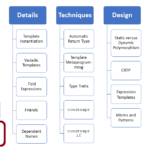
Leave a Reply
Want to join the discussion?Feel free to contribute!